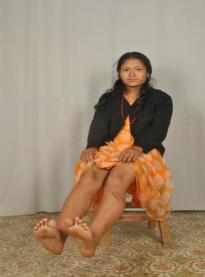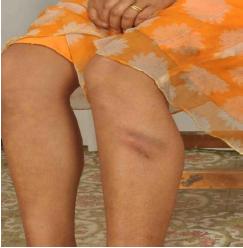
Dear friends,
 The Asian Human Rights Commission (AHRC) has learned that a woman in her twenties was illegally arrested, strung up in a police station and badly beaten for a number of hours after she refused to wrongly identify persons in a theft investigation. Dolakha district police have since charged her with the crime, and she is suffering from the physical and psychological consequences of torture. Her case must be urgently investigated so that any charges against her are conducted according to the law, and she is protected from further harm.
The Asian Human Rights Commission (AHRC) has learned that a woman in her twenties was illegally arrested, strung up in a police station and badly beaten for a number of hours after she refused to wrongly identify persons in a theft investigation. Dolakha district police have since charged her with the crime, and she is suffering from the physical and psychological consequences of torture. Her case must be urgently investigated so that any charges against her are conducted according to the law, and she is protected from further harm.
The officers involved must be suspended from duty and anyone proven to be responsible for her illegal arrest and torture must be held legally accountable. There is still no law criminalizing the use of torture in Nepal and police officers continue to use it with impunity.
CASE NARRATIVE:
According to the information we have received from the Advocacy Forum, an NGO, Ms. Mahima Kusule, 26 was extensively tortured in custody by Dolakha district police during questioning about a theft in her neighbourhood.
The victim reports that when she was at home alone on 12 July, a man she didn’t know came to her house at around 1pm and asked about the owner in a nearby house. When the owner of that house, Goma Kusule, returned home that evening Mahima told her about the visit, and shortly after that Goma visted Mahima to tell her that NRS.60,000 (USD 810) had been stolen from her house.
The following day Mahima received a call from Navaraj Kusule, Goma’s brother, asking her to go to the Satdobato Police Office to identify the man she had spoken to. The police had arrested two boys from her village, and she was asked if she could identify either. When Mahima replied that neither were the man she had met, the officers reportedly pressured her to identify them as the thieves, which she refused to do. She was taken to the Dolakha District Police Office for interrogating, where officers reportedly suggested that she had committed the theft and tried to elicit a confession. Police also interrogated her husband, Pushkar Kusule, for two hours after he tried to visit her at the police station at around 4pm. After that, at approximately 6pm, four policemen and two policewomen accompanied them to their home and searched it, but found nothing. Mahima was released on the condition that she report to the police station the next day at 10 am.
On 14 July Mahima reported to the District Police Officer and was detained on suspicion of the theft. We are told that the police did not produce an arrest warrant or a detention letter, or perform a health check-up as it is mandatory under the law before a person is taken into detention.
 At 9pm Mahima reports that two policemen took her to the litigation section of the station, telling her that she was a criminal and would have the truth tortured out of her. We are told that two policemen (out of uniform) and two policewomen tied her hands with a strip of denim, inserted a bamboo stick between her knees and hands and propped her legs up. Assistant Sub-Inspector Rajiv K. C. allegedly gave the order for the officers to beat Mahima, after which Head Constable Ms. Nirmala Pokhrel beat the soles of feet repeatedly for about 20 minutes while asking about the crime. She used a black plastic pipe with a rod inserted into it.
At 9pm Mahima reports that two policemen took her to the litigation section of the station, telling her that she was a criminal and would have the truth tortured out of her. We are told that two policemen (out of uniform) and two policewomen tied her hands with a strip of denim, inserted a bamboo stick between her knees and hands and propped her legs up. Assistant Sub-Inspector Rajiv K. C. allegedly gave the order for the officers to beat Mahima, after which Head Constable Ms. Nirmala Pokhrel beat the soles of feet repeatedly for about 20 minutes while asking about the crime. She used a black plastic pipe with a rod inserted into it.
We are told that the police officers then threatened to shock the victim with electricity, but did not do so. Instead the women allegedly beat Mahima five or six more times each on her hands, her thighs and then her chin with the same pipe. She was slapped to the face four times.
Mahima maintained that she was innocent. She was told that if she were male, she would be kicked like a football. She says that she eventually cried, at which point the officers untied her hands and instructed her to jump on the spot for about fifteen minutes. She was locked in a detention cell for the night.
The following day her husband and a number of relatives visited the DPO and asked for her release. The police agreed on the condition that she report to them the next day. Since then we are informed that she has been told to report routinely to the DPO’s office.
 When Advocacy Forum staff met Mahima on 15 July they noted that the victim was suffering the most pain in her cheeks and hands, which were both swollen. Her left shin was deeply bruised and the soles of her feet were clotted with blood. During another meeting more than ten days later on 26 July the victim complained that she was still suffering from the same pains, that she had a painful burning sensation in the soles of her feet and that her lower abdomen and her chest were hurting. She also reported severe headaches, nausea and dizziness, along with sleeplessness, a loss of appetite and occasional bouts of sudden fear. The victim was referred to a psychiatrist, who has since diagnosed her with a post traumatic stress disorder, depression and an adjustment disorder.
When Advocacy Forum staff met Mahima on 15 July they noted that the victim was suffering the most pain in her cheeks and hands, which were both swollen. Her left shin was deeply bruised and the soles of her feet were clotted with blood. During another meeting more than ten days later on 26 July the victim complained that she was still suffering from the same pains, that she had a painful burning sensation in the soles of her feet and that her lower abdomen and her chest were hurting. She also reported severe headaches, nausea and dizziness, along with sleeplessness, a loss of appetite and occasional bouts of sudden fear. The victim was referred to a psychiatrist, who has since diagnosed her with a post traumatic stress disorder, depression and an adjustment disorder.
ADDITIONAL COMMENTS:
The AHRC released a statement on the International Day in Support of Victims of Torture in which it reiterated its concerns regarding the routine use of torture by the Nepalese police. As noted in the report, Prevalence of torture, a reminder of the weaknesses of the institutions in Nepal, torture remains a common tool of investigation, yet few concrete measures have been taken to tackle it. The absence of a law criminalizing torture and of an independent mechanisms to investigate allegations of torture, has meant that most victims are denied access to any form of justice. The majority of perpetrators remain on duty and free to continue misusing their power against vulnerable civilian.
SUGGESTED ACTION:
Please join us in calling for a legitimate investigation into these allegations of torture by writing to the authorities listed below.
The AHRC is writing a separate letter to the UN Special Rapporteur on the Question of Torture and to the Office of the High Commissioner for Human Rights field office in Kathmandu.
To support this case, please click here: SEND APPEAL LETTER
SAMPLE LETTER
Dear __________,
NEPAL: A young woman is tortured under interrogation at the Dolakha District Police Office
Name of victim: Mahima Kusule, 26, a resident of Bhimeshwor Municipality – 7, Chisapani, Dolakha district
Names of alleged perpetrators:
1. DSP Mr. Dhiraj Pratap Singh, DPO Dolakha
2. ASI Rajiv K. C., DPO Dolakha, who reportedly gave the order of the beating
3. Head Constable Ms. Nirmala Pokhrel who executed the order
4. Head Constable Mr. Bhim Basnet DPO Dolakha
Date of incident: 14 July 2010
Place of incident: Dolakha District Police Office, Litigation Section
I am writing to voice my deep concern regarding the torture of a 26-year-old woman by police on 14 July after she refused to wrongly identify persons in a theft investigation.
According to the information I have received, Ms. Mahima Kusule, 26 was extensively tortured in custody by Dolakha district police during questioning about a theft in her neighbourhood. The victim reports that a man she didn’t know came to her house on 12 July and asked about the owner in a nearby house. When the owner of that house, Goma Kusule, returned home that evening Mahima told her about the visit, and shortly after that Goma visted Mahima to tell her that NRS.60,000 (USD 810) had been stolen from her house.
I am told that he following day Mahima received a call from Goma’s brother, asking her to go to the Satdobato Police Office to identify the man she had spoken to. The police had arrested two boys from her village, and she was asked if she could identify either. When Mahima replied that neither were the man she had met, the officers reportedly pressured her to identify them as the thieves, which she refused to do. I understand that she was taken to the Dolakha District Police Office for interrogating, where officers reportedly suggested that she had committed the theft and tried to elicit a confession.
Police also interrogated her husband, Pushkar Kusule, for two hours after he tried to visit her at the police station at around 4pm. After that, at approximately 6pm, four policemen and two policewomen accompanied them to their home and searched it, but found nothing. Mahima was released on the condition that she report to the police station the next day at 10 am.
I am told that on 14 July Mahima reported to the District Police Officer and was detained on suspicion of the theft. We are told that the police did not produce an arrest warrant or a detention letter, or perform a health check-up as it is mandatory under the law before a person is taken into detention.
At 9pm Mahima reports that two policemen took her to the litigation section of the station, where she says that two policemen (out of uniform) and two policewomen tied her hands with a strip of denim, inserted a bamboo stick between her knees and hands and propped her legs up. An Assistant Sub-Inspector Rajiv K. C. allegedly gave the order for the officers to beat Mahima, after which Head Constable Ms. Nirmala Pokhrel beat the soles of feet repeatedly for about 20 minutes while asking about the crime. She used a black plastic pipe with a rod inserted into it. The police officers then threatened to shock the victim with electricity, but did not do so. Instead the women allegedly beat Mahima five or six more times each on her hands, her thighs and then her chin with the same pipe. She was slapped to the face four times. Mahima says that she eventually cried, at which point the officers untied her hands and instructed her to jump on the spot for about fifteen minutes. She was locked in a detention cell for the night.
The following day her husband and a number of relatives visited the DPO and asked for her release. The police agreed on the condition that she report to them the next day. Since then she has been told to report routinely to the DPO’s office.
When NGO staff met Mahima on 15 July I am told that the victim was suffering the most pain in her cheeks and hands, which were both swollen. Her left shin was deeply bruised and the soles of her feet were bloody. Ten days later on 26 July the victim complained that she was still suffering from the same pains, that she had a painful burning sensation in the soles of her feet and that her lower abdomen and her chest were hurting. She also reported severe headaches, nausea and dizziness, along with sleeplessness, a loss of appetite and occasional bouts of sudden fear. The victim was referred to a psychiatrist, who has since diagnosed her with a post traumatic stress disorder, depression and an adjustment disorder.
I urge you to take the appropriate measures to ensure that a thorough investigation is launched into this case, conducted by an impartial and independent body. During the course of the investigation the policemen suspected of involvement in her torture should be suspended from duty and if enough evidence is gathered against them, they should be properly and promptly prosecuted. Moreover, the victim must be granted adequate protection and compensation and must be guaranteed an appropriate medical treatment.
Widespread measures must urgently be taken to guarantee the accountability those who indulge in torture, and to prevent its routine use. As a preliminary step, a law criminalizing the act should be adopted without delay, and all the pending allegations of torture must be investigated, with perpetrators sanctioned.
Finally, I wish to draw your attention to the need for the allocation of more financial and human resources to police investigation, along with reforms and training, to effectively stem the use of torture to extract confessions during investigations.
Yours sincerely,
—————-
PLEASE SEND YOUR LETTERS TO:
1. Yadav Raj Khanal
Chief
Human Rights Cell
Nepal Police Headquarter
Phone: +977 1 4411618/4411705/4420542
Fax: +977 1 4415593
email: hrcell@nepalpolice.gov.np
Naxal, Kathmandu
Nepal
2. Dr. Bharat Bahadur Karki
Attorney General
Office of Attorney General
Ramshahpath, Kathmandu
NEPAL
Fax: +977 1 4262582
Tel: +977 1 4262506
Email: info@attorneygeneral.gov.np
3. Mr. Kedar Nath Upadhaya
Chairperson
National Human Rights Commission
Pulchowk, Lalitpur
NEPAL
Fax: +977 1 55 47973
Tel: +977 1 5010015
E-mail: complaints@nhrcnepal.org or nhrc@nhrcnepal.org
4. Mr. Bhim Rawal,
Home Minister,
Ministry of Home Affairs,
Singha Darbar,
Kathmandu,
NEPAL
Fax: +977 1 42 11 232
Tel: +977 1 4211211 / 4211264
5. Mr. Ramesh Chand Thakuri
Inspector General of Police
Police Head Quarters, Naxal
Kathmandu
NEPAL
Fax: +977 1 4415593
Tel: +977 1 4412432 (Secretary to IGP)
E-mail: info@nepalpolice.gov.np, phqigs@nepalpolice.gov.np
Thank you.
Urgent Appeals Programme
Asian Human Rights Commission (ua@ahrc.asia)